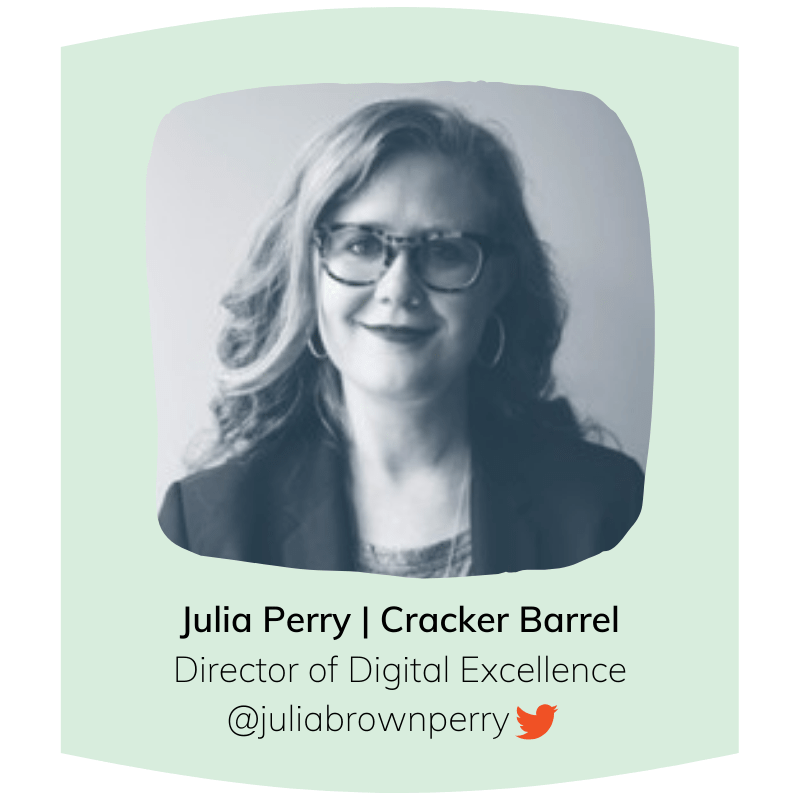#AsktheExperts - 5 Tips for Marketers Who are New to a Role
Congratulations - you landed your next gig! And, like anything new, you’re probably experiencing a range of emotions - both good and bad.
The good: you deserve this.
The bad: that pesky imposter syndrome haunts you once again!
Whether it’s an entry-level or senior-level position, a lot of work has led to you perfecting the skill set needed to get to this place in your career.
Fear not, because the marketing industry is surprisingly diverse - filled with people with a wide range of experience (that’s what makes us so versatile) - and overflowing with career advice.
Setup asked marketers from different backgrounds, working in different leadership roles to share their advice about adapting to a new role.
Meet the Experts:
Tip #1 - Set up meetings with key stakeholders at your new company.
Why It’s Important
Before you can make any changes to the company, it’s important to know the beast you are tackling. Kelly Deen, Vice President of Global Marketing at Jazwares, advises leaders “to get the lay of the land.” She does this by watching, listening, and asking questions.
Meeting key stakeholders may mean meeting external partners or vendors as well. Ryan Murrin, Vice President of Marketing & Franchise Development at Pancheros Mexican Grill, said, “No one process is perfect or the same for new roles, but, most recently, I made meeting our marketing agency partners a priority to get up to speed quickly and to start assessing how the teams (internal and external partners) worked together to encourage more effective collaboration.”
Julia Perry, Director of Digital Excellence, with Cracker Barrel gauges different department heads’ motivations and focuses on aligning goals. “It’s important to study and understand the decisions of the past before recommending sweeping change,” she shares. Aligning goals is key to achieving success within any company.
How To Do It
Have one to one meetings with the team / department and leaders across the organization.
“Taking the time to meet with people in person is the single most critical thing you must do,” said Kelly. “Yes, it takes time, but it's the fastest way to accelerate building relationships, knowing what's working and not working, and making yourself known as a new point of contact or resource.”
Go out.
Kathleen Hestir, Global Social Media Services Manager at Red Bull, recommends: “Offer to go to coffee/lunch/happy hour, remember people’s names and use them, learn about people’s lives outside of work, and look for ways to support your team and build stronger relationships.”
Leave a unique impression.
“Be proactive and send your manager something they can use to introduce you to your co-workers,” said Kathleen, “A short bio and 1-2 photos of you doing something you’re passionate about - keeping the company culture in mind. Make it easy for your new co-workers to recognize your face and strike up a conversation with you by telling them where you’re from, where you went to school, and your hobbies/passions. Try to give them something unique that they can anchor you to in their mind. Maybe you’re a professional weekend DJ, coffee snob, CrossFit king, or die hard snowboarder.”
Study to understand.
Alison Walker, Director of Digital Marketing at Premier Nutrition, advises new managers to “talk to as many people as possible. Understanding their role, their goals, how they like to work with your team/role, and what has or hasn't worked in the past is incredibly valuable.”
Kelly added, “Ask for and review all regular reporting documents - what's currently being measured, how is it being measured... how are teams communicating/keeping each other informed. Understand what processes are in place.” Figure out how the teams operate to find opportunities for improvement.
Set goals across the organization.
“I seek to understand where influence lies, even despite titles and organizational structures. I find that if I am a good listener and can find places where my goals intersect with and advance the goals of other influential people in the company, I can get more done quickly,” states Julia.
Kelly advised: “Create a 30-60-90 day plan. Set some short term personal goals. Map out a plan to get there.”
Tip #2 - As part of your onboarding process, assess the team and agency partner strengths.
Why It’s Important
In order to give feedback to current employees and implement a new strategy, develop relationships with the employees, or set new expectations, new leadership needs to gauge current processes.
Read Related - Identifying Gaps in Your Marketing Team
Alison takes a nurturing approach to assessing current agency partners. “For me, this takes time. I don't like to change a lot right when I start a new role. I have to spend some time working with our agencies and partners before understanding how they're doing and what we might want to improve.”
“Give your agencies problems to solve, not tasks to complete. Great agencies have cultures that thrive on solving problems.”
How To Do It
Assign tasks and assignments.
To assess current team members, agency partners, and all of the above, Julia gives tasks and assignments to see how they handle it. “I try not to judge recent work too harshly as it was likely influenced by the person previously in the role.”
Ask questions/Have a conversation.
When it comes to understanding the agency partners’ strengths and weaknesses, leaders seemed to be more lenient. Fully assessing the situation and asking questions help identify the reasoning behind the thought processes.
Ryan asks his partners if they have a clear scope. “If yes,” he continued, “then are they executing against it effectively? If not, how can we be a good client and get them clarity on scope? Agency partnerships need nurturing and they need to understand their role in helping the business grow. Be a good client. Inform your agency partners in areas beyond just their charge; great ideas come from a variety of areas.”
Read Related - How to Evaluate Your Agency Partner’s Performance
Tip #3 - In every conversation, communicate and listen effectively.
Why It’s important
While being new to an organization offers a unique, outsider’s perspective, listening and understanding the current state of the company before making changes is absolutely critical.
“If you're coming into a leadership role in a new organization, [learning from staff members] will allow you to empathize with people and listen to them, and, in turn, give you a sense of what they may be going through with you,” said Ryan. “You're new to them, and things are changing for them too. If you demonstrate that you're willing to listen, they'll show you the same courtesy.”
Communication and listening is the best tactic to gain respect and get everyone on the same page. Alison shared her own experience adapting to a new team: “I started a role as Marketing Director at a small startup that was not used to process and was incredibly resistant to change. It took a lot more time to build trust than I thought it would, but after many conversations about individual and team goals and sharing my vision, we were able to work together towards a common goal. Establishing a common goal is so important. Many people immediately assume someone new to a role is going to change things for the sake of change or because they want to ‘do it their way.’ To me, change is only needed when something isn't working and more often that is easier when the team understands why and can see there's a benefit for them as well.”
“To me, change is only needed when something isn’t working and more often that is easier when the team understands why and can see there’s a benefit for them as well.”
How To Do It
Get to know everyone you can, in every role.
“Ask them what they'd like to see from you or your team,” said Ryan.
Embrace feedback.
“Take the time to seek out and be open to push-back and suggestions,” added Ryan. “Dig deeper if you can tell something is below the surface with a partner or team member. You're likely right.”
Create an open dialogue.
This eases alignment and conflict management. When it comes to conflicts, Ryan advised to “address it head-on, and acknowledge it when it happens. Conflict is ok. Obstinance isn't.”
Tip #4 - Use the resources available to you.
Why It’s Important
You can spend all day spinning your wheels trying to think of solutions on your own, but why stress when there are plenty of tools that are easily accessible that provide leadership ideas or training insights right in front of you.
How To Do It
Get connected on social media.
Set alerts across social channels to notify your brand and competitors in order to engage accordingly. Kelly advises leaders to: “Identify who you should be following on LinkedIn and other social platforms - people, other/competitive companies, trade organizations, etc. (to understand the day to day conversation).”
Adopt an onboarding buddy.
Kathleen suggested to find “someone who is on your level, ideally someone who you don’t work with directly, to give you an additional perspective on the company culture, any unwritten rules, how people behave and operate, and answer general questions about the company.”
Read industry publications.
Ryan listed a number of resources: Marketing Publications - AdAge, MediaWeek, etc. - depending on your focus; Axios and Reuters for news; alerts across social media on your brand and competitors; Seth Godin's - especially Unreasonable clients and How to be a great client.” Alison recomments “The First 90 Days” as a tool to provide perspective on getting up to speed in a new role in a new industry.
Julia recommended Smart Insights which offers a collection of frameworks, templates, and e-learning to build strategies from scratch and make changes quickly.
Continuously learn.
Josh Perlstein, the CEO of Response Media, continues his marketing education by signing up for webinars, attending conferences and reading any articles or case studies that pique his interest. His advice is not to just attend events, but to actively talk to others. From walking the exhibit hall floor, to asking way too many questions in webinars or comments, Josh is constantly making connections with others. “I frequently ask clients, our employees, and peers, ‘What’s new, what’s working these days, and what do you think is coming next?’”
Tip #5 - Be patient with your career progress/current skills (or lack thereof).
Why It’s Important
Adapting to a new role is no easy task! You have to keep in mind that not only is the company adjusting to you, but you are adjusting to the company. It’s natural to be stressed or overwhelmed...but focus on these tidbits to slow your heart rate a little.
“It’s okay to not have all the answers.”
How To Do It
Keep a positive attitude.
“I think attitude is the most important thing,” shared Kelly. “Be positive, open, energetic and do more listening than talking.”
Be patient.
“Particularly coming from an agency background,” stated Julia, “I was impatient with myself in the early days of my client role. I was used to getting hired and producing work FAST. In my new position, my boss advised me not to worry so much about how quickly I could assess the landscape and deliver work. He reminded me that my experience and the perspectives I shared through the course of our daily meetings and discussions were already providing value and that there would be plenty of time for creating deliverables during my long career with the company. And a year later, that has proven true!” exclaimed Julia.
Recognize the unique value you bring to the table.
“I think the worst thing you can do,” said Alison, “entering any new role involves pretending that you know everything and have all the answers already. While it's natural to want to prove yourself, remember that people also value being involved in decisions and want to share their knowledge with you.”
Like Alison said, “It’s okay not to know the answers.” A new role comes with its own challenges, but, with the right mindset, you can conquer anything. Ask questions, be open, and learn from everything and everyone you can!
Still looking for that dream job or that dream candidate? Check out these interview questions for marketers!
Read Related - The Marketing Career Path
Setup works with recruiters to help experienced marketing leaders land new jobs or fill positions. Interested? Contact us!
















Super Bowl LX showcased brands pushing weight loss drugs, AI, and utilizing celebrities to an absurd amount (what’s new?), as well as another “Minions" movie in theaters (surprised but not shocked). Every marketer weighs in on who won their hearts…and this year, for us, it came down to brands that leaned into storytelling that included nostalgia and emotion, specifically with a human lens.